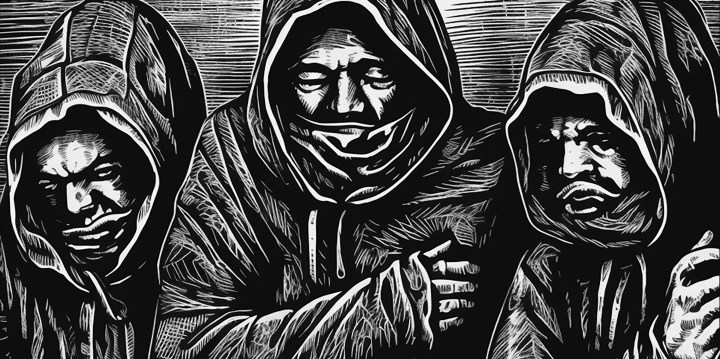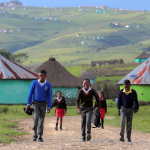POET’S CORNER
In impoverished, fight-or-flight Mzansi, snow flies upward

A line from a poem evokes a feeling of things being wrong-headed, as South Africans navigate increasing impoverishment and fear. One thing we can do is finally vote differently.
There are four cardinal points. But we know that between any two adjacent ones, there is another direction. In fact, between any two given directions there’s another one, and they will never meet.
A group of people can walk towards you. If you don’t know them, you might experience a little fear for your well-being. If, on the other hand, they’re friends, the feeling might be relief. Anyone can approach you or distance themselves from you.
In a poem called Crowd by South African poet Phillippa Yaa de Villiers, snow flies upward, as if startled back into flight by something it sees taking place down below. I remember when Nelson Mandela was released from prison in 1990, and I fell sobbing into my wife’s arms on the sofa in front of the telly. I’m willing to bet that I was not the only one. Many among us thought the end of apartheid and a new era of one human, one vote would usher in the required impetus to make snow fall naturally.
It seems as though everyone and their sibling owns a gun and is ready to use it.
Since the ANC acceded to power, in the first elections in South Africa in which every eligible citizen – no matter their gender, creed or skin colour – was allowed to take part, snow has not stopped flying upward. What we had imagined would happen turned out to be wrong, and only a few flakes touched down while a good number of South Africans barely survive squalor.
Today, the group walking towards you is mysterious and not to be relied on. There is a general lack of trust. Feelings of patriotism have taken a knock on the head, especially following so much hope and expectation. Mzansi is rich but its people are impoverished. They’re not poor. They have been and are being impoverished. The consequences of this situation, produced by governmental inaction or fumbling, are high crime and diminished respect for the well-being of other individuals and groups of people.
Ubuntu, too, has taken a knock on the head. It seems as though everyone and their sibling owns a gun and is ready to use it. We have just spoken about a group of people approaching you, probably at dusk: you hide your smartphone or lock your car doors or clutch your purse tighter.
Margaret Walker’s poem For Malcolm X wonders the following out loud: “When and where will another come to take your holy place? / Old man mumbling in his dotage, crying child, unborn?” This question applies to South Africa and Zimbabwe, to name but two.
Let snow float down here without let. Let the men and women walking toward me engender less fear in me, because it remains true that when we’re scared and outnumbered, we receive a good dose of adrenalin that tells us to either flee or fight, in which case all reason flies out the window and the instinct of survival kicks in, a dangerous situation indeed because the brain is under lockdown then.
This emboldens you to take risks to hold your ground. There are mouths to feed. This gaze at the ever-declining situation of the majority of South Africans is not meant to justify crime and violence, the same way energy equals mass times the speed of light squared – Einstein’s E = mc² – does not say it’s okay to develop nuclear weapons and drop them on the heads of enemies. The purpose is to elucidate, make us understand what happened and which direction we should avoid from here on.
There are many more paths to explore than just the four cardinal points. It makes one wonder whether South Africa really belongs to all who live in it, black and white, as the 1955 Freedom Charter asserted. These days I think it is harmless to replace “black and white” with “poor and rich”. “Their / face no longer resembles someone / I could recognise / in a crowd,” the speaker in Yaa de Villiers’s poem states. They have been animalised and dehumanised.
It is much harder to cater for all the 60 million souls that make up the country today, than it was for a small minority.
One of the many “other” directions Mzansi could take remains voting the ANC out, as opposed to always voting for the 1955 ANC which, alas, no longer exists. How many generations will it take for the nation to come to terms with that reality? How many more shanty settlements? How much more wanton crime and murder?
Mind you, not voting for the ANC does not mean another party will patch things up – but is it not worth the try? I have read and heard the common incantation about how, ever since the ANC took over, things have soured. But they were sour before, except for a small minority of South Africans.
Read more in Daily Maverick: With Earth on the killing altar, the gods are pacified with sweet but empty words
Read more in Daily Maverick: Mourning loved ones, weeping for lost years, writing to purge – join me on a journey in poetry
The apartheid government had to only worry about protecting and enriching five million Caucasoid South Africans and keeping in the dungeons 23 million Negroid South Africans. It was of course easier. The current situation does not stem from the statement that “blacks are in charge and blacks can’t govern”. It is much harder to cater for all the 60 million souls that make up the country today, than it was for a small minority. I’ll say that much for the ANC, though not for the Zimbabwe over which Robert Mugabe ruled.
If the two sister countries shun a new route, the people pulling the strings of government today will not be interested in change. There’s a fork in the road, and we know where one of the paths leads. When the hell will parties start existing based on policy and manifesto instead of the activity of melanocytes in the skin? Only on that day will we start seeing improvement in the daily lives of all South Africans. And when that happens, xenophobia, too, will fly out the window, until snow starts falling earthward again and into everyone’s vegetable plot. DM
Rethabile Masilo is a Mosotho poet from Lesotho who lives in France.
Zimbabwe
By Rethabile Masilo
For Charity and Francis Matyaka
They occupy the street
like fan club members
and chant against the paucity
of grey men. My father died
in sorrow, one says, a mulatta
in the back. There’s
a silent feeling around
a quiet boy, black as the mood
of this day in June,
bright as what he will become.
He steals glances at me.
Their song is quiet, strong
as a half-night’s wind
that whistles down hills
telling its own grief.
I do not speak his tongue
and secretly hope
he has been schooled enough
to tell his story in words
I’d know – what eats him.
His father was the teacher
they came for at the school:
Francis, whom he watched beaten
in a donga near their home
by angry masks; sand had drunk
all his life as his mother stood
with her head in her hands,
like she wanted to unscrew it
and give it back to God.
(Based on the Telegraph article “Death toll rises in Robert Mugabe’s reign of terror before election” by Angus McDowall and special correspondent in Harare.)
Crowd
By Phillippa Yaa de Villiers
Snow flies upward.
Men and women
walk towards me, an army of ragged desperate but
steadily, solidly, advancing on me. I hold my ground
outnumbered they always said I am brave
and as they walk through me
their tears fall down my heart
and freeze into blades of ice and I too have lost
someone dear to me but
I cannot remember their name and their
face no longer resembles someone
I could recognise
in a crowd.
This story first appeared in our weekly Daily Maverick 168 newspaper, which is available countrywide for R29.




















Really enjoyed this piece, well done to the writer.
Thank you, mnmpofana. I hope you also agree with the professed point of view.
Kind regards.